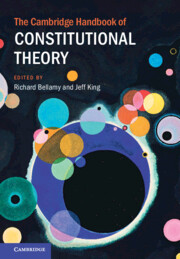Book contents
- The Cambridge Handbook of Constitutional Theory
- The Cambridge Handbook of Constitutional Theory
- Copyright page
- Contents
- Figures
- Contributors
- Frontispiece
- Preface and Acknowledgements
- 1 Introduction
- Part I Values
- Part II Modalities
- Part III Institutions
- Part IV Challenges for Constitutional Democracy
- Bibliography
- Index
- References
Bibliography
Published online by Cambridge University Press: 27 March 2025
- The Cambridge Handbook of Constitutional Theory
- The Cambridge Handbook of Constitutional Theory
- Copyright page
- Contents
- Figures
- Contributors
- Frontispiece
- Preface and Acknowledgements
- 1 Introduction
- Part I Values
- Part II Modalities
- Part III Institutions
- Part IV Challenges for Constitutional Democracy
- Bibliography
- Index
- References
- Type
- Chapter
- Information
- The Cambridge Handbook of Constitutional Theory , pp. 1089 - 1210Publisher: Cambridge University PressPrint publication year: 2025

